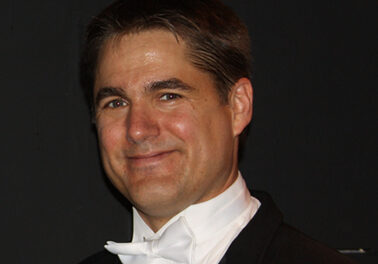The NCSU Center Stage series hosted DBR & The Mission in Stewart Theatre, the highlight of a three day residency. Performing works primarily by the composer, but also Philip Glass and others, the charismatic Daniel Bernard Roumain and his ensemble converted a well-behaved, diverse audience into a team of enthusiastic devotees of contemporary music.
Prior to the concert, Roumain and violinist, Matt Szemela engaged a small group of music aficionados in a conversation about art. Quoting modern dance choreographer, Pearl Lange, Roumain primed the attendees saying “all arts are theatrical.” The classically trained among us might consider it spectacle, and indeed one critic has referred to his work as profane. But, like his West Coast counterpart, Pamela Z and others, Roumain draws from his classical training, the twentieth century avant-garde, and the vernacular of hip-hop in search of a new relevant voice.
Roumain and The Mission entered the nearly dark stage with illuminated blue background; the composer-violinist commenced the show with a slow melodic invitation. Like a sunrise accompanied by the gradual layering of ostinatos, the group completed the welcome — a sonic awakening. One immediately hears the minimalist influence of Philip Glass, DBR’s friend and mentor. Enhanced with the electronic wizardry of Elan Vytal a.k.a. DJ Scientific (laptop and turntables), we recognized that “we’re not in Kansas anymore.” And it works, according to Roumain, because iPod ™ technology has allowed our ears to adapt to an eclectic mix of musical genres. True enough. “Fayetteville” for violin and electronics, (electronics composed by Vytal) from DBR’s recent recording, for example, is a wonderfully funky little piece.
DBR’s compositional output grows out of his well-informed yet unconditional love of a variety of musical styles, including the contemporary vernacular. In addition to selections from Roumain’s composition Hip-Hop Studies and Etudes, were excerpts from Numerical Music, Event Music, and recently recorded etudes4violin&electronix (Thirsty Ear Recordings, Inc., 2007). Short and accessible, “Numerical Music” (No. 2) which tangentially refers to John Cage and choreographer Merce Cunningham’s chance explorations, requires that performers learn the numerical assignment of pitches. And with a splash of DJ Scientific’s alchemic humor, DBR nods to Earle Brown in “Event Piece No. 6” while exploiting texture and timbre. His appeal to the Millennium Generation, however, emanates from the driving, often complex rhythm of the hip-hop infused music. I’m not sure how the audience members remained seated!
Roumain brings out the best in his collaborators. Earl Maneein and Matthew Szemela displayed technical virtuosity with the passion of Jimi Hendrix as they coaxed shimmering, neon colors from their instruments. An introductory solo by Jon Weber demonstrated how the viola can be assertive (even “cool”) using effects pedals. Yayoi Ikawa (piano) and Roumain’s duet with cascading Debussy-like melodic material provided a stunning contrast to the high energy works. One with the instrument, Ikawa is technically adept with a rich palette. And in the encore in C# minor, Jessie Reagen (cello) and DBR cut loose with a rhythmically amazing improvisation. Like the Philip Glass ensemble, this well-rehearsed group works together like family.
The Mission, whose goal is to communicate, goes beyond the delivery of musical entertainment. The plugged-in and switched-on string quartet, splayed across the stage, make themselves vulnerable to the vibrations of listeners, a gesture that invites a two-way conversation. And joined by Kenny Grohowski (drums), Jim Robertson (bass), DJ Scientific and Ikawa, the complete ensemble crosses lines of arbitrary distinction created by the commercial music industry. In this concert hall, all are welcome!











